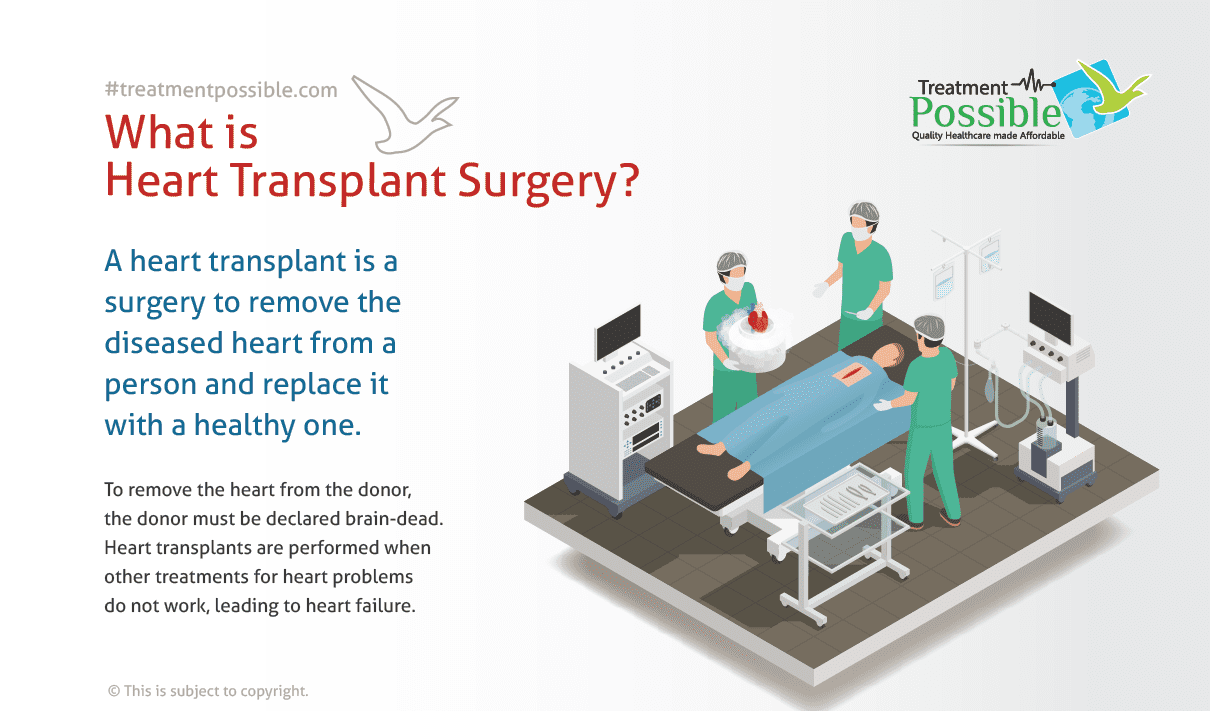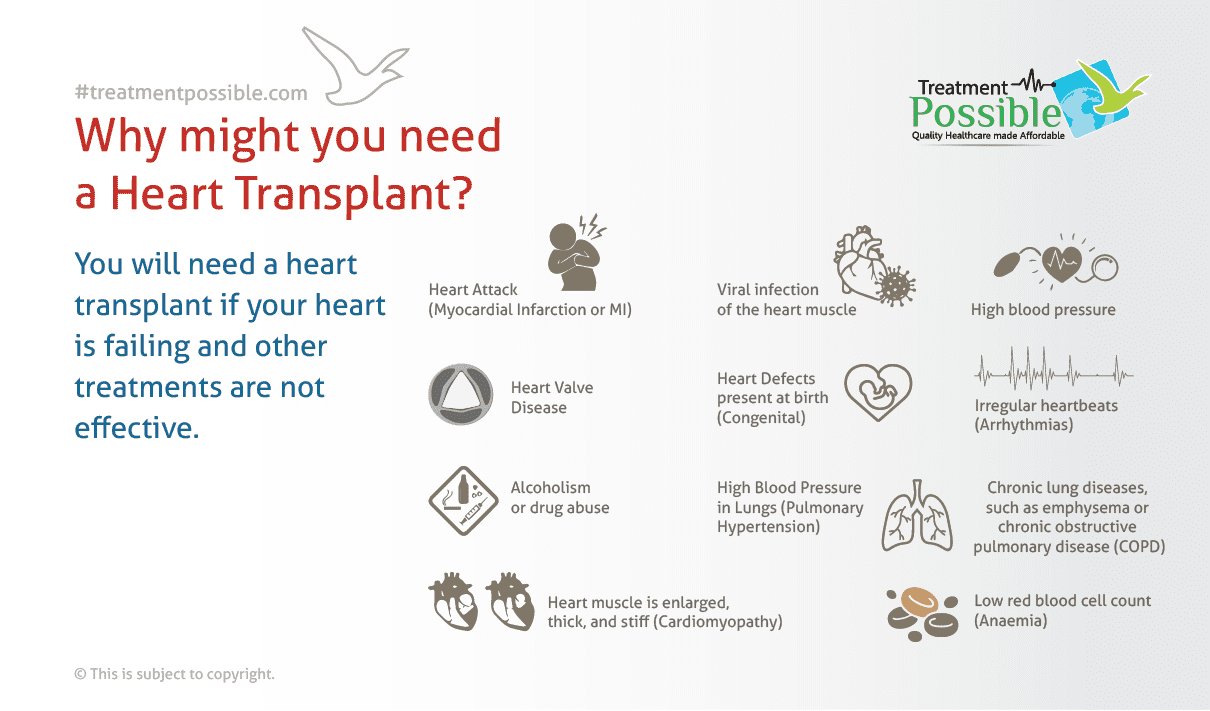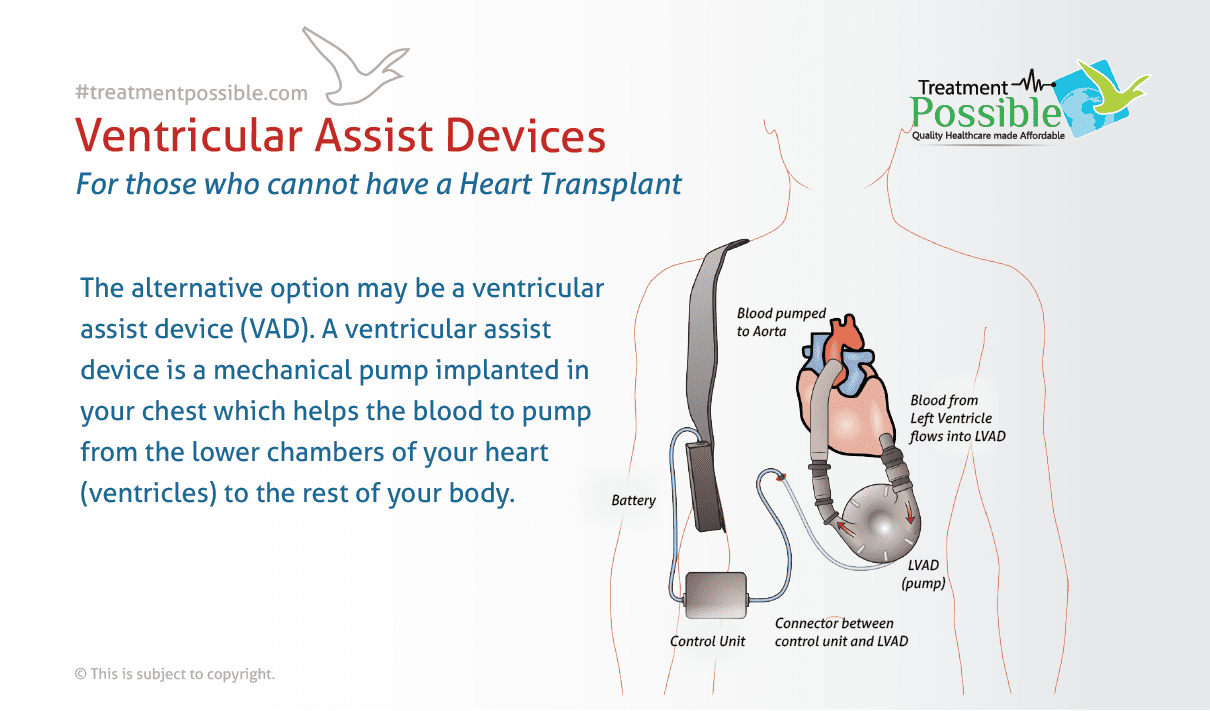Heart Transplant
Verified by Dr Kumud Dhital – Heart and Lung Transplant Surgeon
What is Heart Transplant?
A Heart Transplant is a surgery to remove the diseased heart from a person and replace it with a healthy one. To remove the heart from the donor, the donor must be declared brain-dead. Heart transplants are performed when other treatments for heart problems do not work, leading to heart failure.

How can you decide whether you are a good candidate for heart transplant or not?
A heart transplant is not suitable for everyone. However, you will not be a good candidate for a heart transplant if you:
- Are at an advanced age that would interfere with the ability to recover from a transplant surgery
- Have another medical condition that could shorten your life, regardless of receiving a donor heart, such as a serious kidney, liver or lung disease
- Have an active infection
- Have a recent personal medical history of cancer
- Are unwilling or unable to make lifestyle changes necessary to keep your donor heart-healthy, such as not drinking alcohol or not smoking
You will need to evaluate to see if you are eligible for a transplant. The evaluation will check to see if you:
- Have a heart condition that would benefit from transplantation
- Might benefit from other, less aggressive treatment options
- Are healthy enough to undergo surgery and post-transplant treatments
- Are willing and able to follow the medical program outlined by the transplant team
- Can emotionally handle the waiting period for a donor’s heart
- Have a supportive network of family and friends to help you during this stressful time
When will you need to undergo Heart Transplant?
You will need a heart transplant if your heart is failing and other treatments are not effective. End-stage heart failure (final stage of heart failure) occurs when the heart muscle is failing severely in its attempt to pump blood through the body. It means other treatments are no longer working. Despite its name, a diagnosis of heart failure does not mean that the heart is about to stop beating. The term failure means the heart muscle is failing to pump blood normally as it could be damaged or very weak, or both.
Some causes of heart failure include:
- Heart attack (myocardial infarction or MI)
- Viral infection of the heart muscle
- High blood pressure
- Heart valve disease
- Heart defects present since birth (congenital heart defects such as Atrial Septal Defect (ASD), Ventricular Septal Defect (VSD), etc)
- Dangerous recurring abnormal heart rhythms (ventricular arrhythmias) not controlled by other treatments
- High blood pressure in the lungs (pulmonary hypertension)
- Alcoholism or drug abuse
- Chronic lung diseases, such as emphysema or chronic obstructive pulmonary disease (COPD)
- Heart muscle is enlarged, thick, and stiff causing the heart muscle to weaken (cardiomyopathy)
- Low red blood cell count (anaemia)
- Coronary artery disease (Atherosclerosis)
- Failure of a previous heart transplant

Want more clarification about medical expense & treatment plan?
Consult an Experienced Surgeon online for free and Plan Your Heart Transplant Surgery In India
What are the Risks Associated with a Heart Transplant?
Potential risks of a heart transplant may include:
- Bleeding during or after the surgery
- Blood clots that can cause heart attack, stroke, or lung problems
- Breathing problems
- Kidney failure
- Coronary allograft vasculopathy (CAV) is a problem with the blood vessels that carry blood to the heart muscle which becomes thick and hard and can cause serious heart muscle damage.
- Rejection of the transplanted heart: One of the most significant risks after a heart transplant is your body rejecting the donor’s heart. Your immune system may see your donor heart as a foreign object and will try to reject it, which damages the heart. Every heart transplant recipient will receive medications to prevent rejection (immunosuppressants), and as a result, the rate of rejection continues to decrease. The medications will trick the immune system into accepting the transplant and keep it from attacking it. At times, a change in medications will halt rejection in case it occurs. Rejection often occurs without symptoms. To determine whether your body is rejecting the new heart, you should have frequent heart biopsies during the first year after your transplant. After that, you won’t need biopsies as often. During the biopsy, a tube is inserted into a vein in your neck or groin and will be directed to your heart. A biopsy device is a tiny sample of heart tissue, which is examined in a lab.
- Primary graft failure: With this condition, the most frequent cause of death in the first few months after the transplant, the donor’s heart doesn’t function.
- Infection: Immunosuppressants decrease your ability to fight infection. Many people having heart transplants will have an infection that requires them to be admitted to the hospital in the first year after their transplant.
What are the Side Effects of Heart Transplant Rejection?
You will need to take the medicines to prevent or treat rejection for the rest of your life. These drugs have side effects too. The side effects will depend on the medications you take.
- Current or repeated infection that does not get better with treatment
- Poor blood circulation throughout the body, including the brain
- Metastatic cancer is when cancer has spread from the place it started to one or more other places in the body.
- Severe health problems that would make you unable to tolerate the surgery
- Serious health problems other than heart disease that would not get better after transplant
- Non-compliance with the treatment regimen. For instance, not following your healthcare provider’s directions nor taking medicines as prescribed or missing appointments.
- Drug or alcohol abuse
Ventricular Assist Devices:
For people who cannot have a heart transplant, the alternative option may be a ventricular assist device (VAD). A ventricular assist device is a mechanical pump implanted in your chest which helps the blood to pump from the lower chambers of your heart (ventricles) to the rest of your body.

VADs are commonly used as temporary treatments for people waiting to have heart transplants. These devices are increasingly used as long-term treatments for people who have heart failure but are not eligible for heart transplants. If a VAD does not help your heart, doctors may consider a total artificial heart. This is a device that replaces the ventricles of your heart as an alternative short-term treatment while waiting for a heart transplant.
In India due to legislation, an Indian patient is preferred as a recipient of a donated heart. Only if an Indian patient is not available will the heart be allotted to a foreigner but the chances are rare. Therefore Left Ventricular assist device (LVAD) is recommended for a foreigner and for patient’s who cannot wait long in the hope of a matching cadaver donor.
Want more clarification about ventricular assist devices & associated medical expenses?
Consult an Experienced Doctor online for free and Know more about Ventricular Assist Devices (VAD)
What Happens during a Heart Transplant Surgery?
Heart Transplant will require a hospital stay of 7 to 14 days, or even longer. Heart transplant surgery usually lasts for four hours approximately. During that time, you will be placed on a heart-lung machine to keep blood circulating throughout your body. A heart transplant follows the below process:
- Step 1: The surgeon will make an incision in your chest. Your surgeon will separate your chest bone and open your rib cage to reach your heart.
- Step 2: The surgeon will put tubes into your chest so that your blood can be pumped through your body by a heart-lung machine while your heart is stopped and replaced.
- Step 3: Once the blood has been completely diverted into the bypass machine and is being pumped by the machine, your doctor will remove the diseased heart.
- Step 4: The surgeon will sew the donor heart into the place and once the heart begins beating, you will be removed from the heart-lung machine. In most cases, the new heart will begin to beat as soon as the blood flow is restored. Sometimes an electric shock will be required to prompt a heartbeat.
As you recover and start to breathe on your own, the breathing machine will be adjusted accordingly. When you can breathe completely on your own then your doctor will remove the breathing tube.
Post-operative care after a Heart Transplant Surgery:
After your surgery is finished, you will be taken to the intensive care unit (ICU). You will be constantly monitored and given pain medication, and outfitted with drainage tubes to remove excess fluid from your chest cavity. After the first day or two after the procedure, you’ll most likely be moved from the ICU. Blood samples are taken often to monitor your new heart, as well as other body functions. These will include your lungs, kidneys, liver, and blood system. When your healthcare provider decides you are ready, you will be moved from the ICU to a private room on a surgical unit or transplant unit. You can gradually increase your activity when you get out of bed and walk around for longer periods. You can start drinking liquids and gradually eat solid foods as tolerated.
Due to the frequency and intensity of the monitoring, many people decide to stay close to the transplant center for the first three months after the transplant. Afterwards, follow-up visits are less frequent, and it is easier to travel back and forth. You will also be monitored for any signs or symptoms of rejection, such as shortness of breath, fever, fatigue, not urinating as much or weight gain.
It is important to let your transplant team know if you notice any signs or symptoms of rejection or infection. Your healthcare team will closely watch your anti-rejection (immunosuppression) medicines to make sure you are getting the right dosage and the best combination of medicines. To determine whether your body is rejecting the new heart, you will be having frequent heart biopsies in the first few months after the heart transplantation. The frequency of necessary biopsies decreases over time.
A biopsy is done once a week in the early period after a transplant, and then it gradually changes to monthly or longer intervals. The biopsy procedures may eventually stop. The procedure involves a right heart catheterization. A special catheter is threaded through a vein in your neck or groin and into the right atrium of your heart. Your doctor will take 4 to 6 tiny tissue samples through the catheter and check them for signs of rejection. If your doctor finds signs of rejection, he or she will adjust your anti-rejection medication. The biopsy procedure has its instructions and risks, and your healthcare provider will discuss these with you.
Once you are at home, it is advisable to keep the surgical area clean and dry. Your doctor will give you specific bathing instructions. You will need frequent follow-up visits after the transplant. To allow the transplanted heart to survive in your body, you will need to take medicines for the rest of your life to fight rejection. Each person may react differently to the medications. In addition to taking daily anti-rejection medications, you will need to follow a healthy diet and lifestyle as prescribed by your doctor. This includes not smoking and exercising regularly if you’re able to. Some women who had heart transplants do become pregnant. However, talk to your doctor if you’re considering having children after your transplant. You will need medication adjustments before becoming pregnant, as some medications can cause pregnancy complications.
Follow-up after the Surgery:
You will need to make several long-term adjustments after you have had your heart transplant. These include the following:
- Taking immunosuppressants: These medications will decrease the activity of your immune system to prevent it from attacking your donated heart. You will have to take some of these medications for the rest of your life. Since immunosuppressants render your body more vulnerable to infection, your doctor may also prescribe antibacterial, antiviral and antifungal medications. Some drugs could raise your risk of developing conditions such as high blood pressure, high cholesterol, cancer or diabetes. Over time, as the risk of rejection decreases, the doses and number of anti-rejection drugs can be reduced.
- Managing medications, therapies and a lifelong care plan: Your doctor will instruct you regarding your lifestyle like exercising, eating a healthy diet and not using tobacco products. Follow all of your doctor’s instructions, see your doctor regularly for follow-up appointments, and let your doctor know if you have signs or symptoms of complications. It’s a good idea to set up a daily routine for taking your medications so that you don’t forget. Keep a list of all your medications with you at all times in case you need emergency medical attention, and tell all your doctors what you take each time you are prescribed a new medicine.
- Cardiac rehabilitation: These programs incorporate exercise and education to help you improve your health and recover after a heart transplant. Cardiac rehabilitation can help you regain your strength and improve your quality of life, which could be started before you are discharged from the hospital.
What is the Success Rate of Heart Transplant?
Receiving a new heart will improve your quality of life considerably, but you have to take good care of it. The overall survival rate worldwide is more than 85% after one year and about 69% after five years for adults.
What is the Heart Transplant Surgery Cost in India?
The cost of a heart transplant in India is Rs 25,00,000/-. This is a package cost for evaluation, surgery & hospital fees. Additional to this, please note that you will incur the expense of accommodation during the waiting period along with dietary requirements. Fortunately, we have our own fully content service apartments with equipped kitchen. These are made available to our patients at an affordable rate. You can ensure home-cooked food which is healthy for the patient as well as a cheaper option for a long stay treatment plan.
Need help to plan your heart transplant surgery in India?
Consult an Experienced Doctor online for free and get a treatment plan
How do we help you in Planning for a Heart Transplant in India?
Treatment Possible is associated with the best heart transplant hospitals and top cardiac surgeons in India who are experienced & specialize in heart transplant surgery. Our understanding of the Indian Medical Services and Healthcare market and our valued relations with cardiac surgeons enables us to ensure that you get the best medical services while keeping the cost of transplant reasonable, affordable and transparent.
The results of the heart transplantation in India arranged by us have been mostly positive. It is very important to undergo all the prescribed tests based on medical history so that the doctors can determine the perfect medical solution yet manage to keep surgery cost low.
Get Free Consultation with chosen Top Cardiac Surgeons in India with the hassle-free setup of post-operative recovery care, medical travel & stay during the Medical treatment. You can mail us at care@treatmentpossible.com or contact us at our WhatsApp no. +91 89288 11870
Check out more valuable information about Ventricular assist device (VAD) implantation in India.
